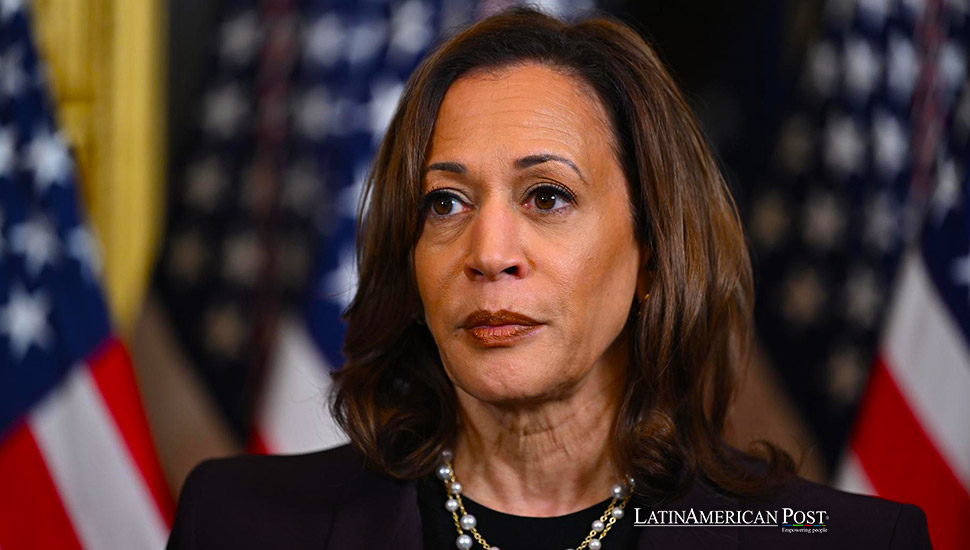Kamala Harris Faces Challenges with Hispanic Voters Amid Presidential Bid

As Democrats rally around Kamala Harris as their likely presidential nominee, the vice president faces a significant hurdle: gaining the support of Hispanic voters, a crucial constituency for the Democratic Party.
Kamala Harris has emerged as the Democratic frontrunner following President Joe Biden’s decision not to seek re-election. However, Harris’s campaign is confronted with a critical challenge: winning over Hispanic voters, a historically pivotal demographic for Democratic candidates. Recent polls indicate that Harris is struggling to secure the robust support Democrats have traditionally enjoyed among Hispanic voters.
National polls conducted before Biden’s withdrawal and endorsement of Harris showed the vice president garnering lackluster support among Hispanic voters. This demographic, one of the fastest-growing electorates in the United States, has shown waning enthusiasm for Democratic candidates in recent years.
Fernand Amandi, a Miami-based Democratic pollster who worked on President Obama’s 2012 re-election campaign, told The Miami Herald, “There’s work to be done. It won’t be the instant shot in the arm that it’s already proving to be with some other voters. However, the good news for Team Harris is that there is an opportunity to relaunch and reset the entire presidential campaign with Hispanic voters. They were underperforming before. And the only way to go is up, in terms of potential ceiling.”
Amandi’s polling firm, Bendixen & Amandi International, conducted a survey earlier this month revealing that Biden and Harris were supported by just 42% of Hispanic voters nationally, roughly the same as former President Donald Trump’s 41%. In contrast, exit polls from the 2020 election showed Biden and Harris winning 65% of the Hispanic vote.
Historical Trends and Recent Polls
This decline in support is part of a broader trend observed over the past decade. Another poll released by Quinnipiac University showed that Harris and Trump were tied among Hispanic voters at 39% each in a multi-candidate field that included third-party and independent candidates like Robert F. Kennedy Jr.
Amandi cautioned against overinterpreting these early polls, noting that Biden’s exit has created a “completely different political environment.” He believes the coming weeks, as Harris names her running mate and formally accepts the Democratic nomination, will provide more insight into her standing with Hispanic voters. “We’re going to have to reevaluate everything,” Amandi said. “Was Biden underperforming among Hispanics? No question. But this is an opportunity now to see what this new ticket does and whether it can get Hispanics to revert to the mean.”
The Democratic Challenge
Democrats have long relied on strong support from Hispanic voters to win elections, particularly in critical states like Florida and Arizona. However, recent years have seen cracks in this coalition, with Republicans making significant inroads. Mike Madrid, a veteran Republican political consultant in California and outspoken Trump critic, told The Miami Herald that Harris might be able to “slow the bleeding” with Latino voters, but reversing the trend is daunting. “Kamala can begin reframing this, but to think that she’s going to restructure the race with Latinos fundamentally is unlikely,” Madrid said. “They’ve got to start understanding that they have a problem with this base vote. It’s not a candidate problem.”
Harris has a history of mobilizing Latino voters in California, where she secured a majority of the Latino vote in her campaigns for state attorney general in 2010 and 2014. Despite this, she failed to capture over 50% of the Latino vote in her 2016 Senate race against Democrat Loretta Sanchez. While Harris has the backing of influential organizations like Voto Latino and BOLD PAC, more than this support is needed to alter her standing among Hispanic voters significantly.
Signs of Improvement
Despite the challenges, there are some indications that Hispanic voters might be more receptive to Harris than they were to Biden. A CNN/SSRS poll found that Harris had a slight lead over Trump among Hispanic voters, 47% to 45%. Another poll by NPR, PBS News, and Marist College showed that Harris had 47% support among Hispanic voters, compared to Trump’s 31%.
However, some analysts caution that these polls may temporarily boost Harris as voters adjust to Biden’s departure and the prospect of a new Democratic candidate. Mike Noble, an Arizona-based pollster, told The Miami Herald that while Harris offers a fresh face for the Democrats, she still must address critical issues such as inflation, housing affordability, and immigration. “Harris isn’t some outsider candidate. She’s Biden’s right-hand person. She still has to answer to the electorate’s concerns,” Noble said.
Noble also expressed skepticism about significant shifts in voter allegiance. “I don’t think [the race] resets,” he said. “The electorate is so polarized, and that’s the inherent problem. You’re not going to see these big swings.”
Moving Forward
Harris’s campaign faces the formidable task of regaining the trust and support of Hispanic voters. Hispanic voters are not monolithic; they represent diverse backgrounds, experiences, and political priorities. Successfully appealing to this group requires addressing their concerns and demonstrating a genuine commitment to their issues.
A spokesperson for Harris’s campaign did not respond to requests for comment, leaving open questions about her strategy to engage Hispanic voters in the future.
In Latin American politics, the dynamic between political candidates and Hispanic voters in the U.S. reflects broader trends of shifting allegiances and the impact of targeted political outreach. Just as political movements in Latin America must navigate diverse and evolving electorates, U.S. politicians must similarly adapt their strategies to resonate with a changing demographic landscape.
Kamala Harris’s journey to secure the Democratic nomination and win the presidency involves addressing significant challenges with Hispanic voters. While recent polls suggest potential for improvement, the vice president must effectively communicate her platform and policies to this critical constituency. As Harris prepares for the general election, her ability to connect with Hispanic voters could prove decisive in a tightly contested race.
Also read: Biden’s New US-Mexico Border Asylum Ban Faces Challenges
The evolving relationship between Harris and Hispanic voters offers a microcosm of broader electoral shifts and the importance of responsive and inclusive political engagement. As the 2024 election approaches, Harris’s campaign strategies and outreach efforts will be closely watched by supporters and critics, reflecting the high stakes of this pivotal election.





